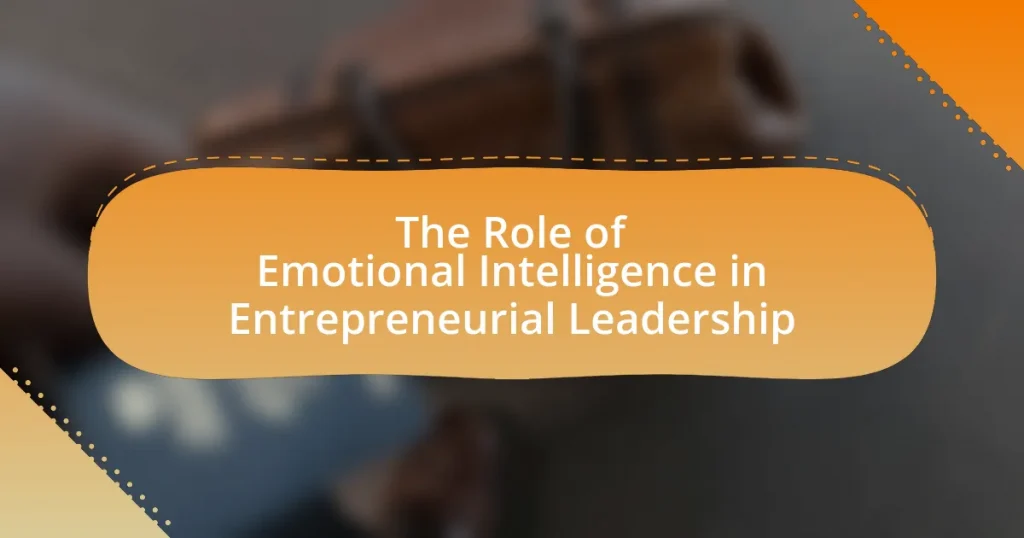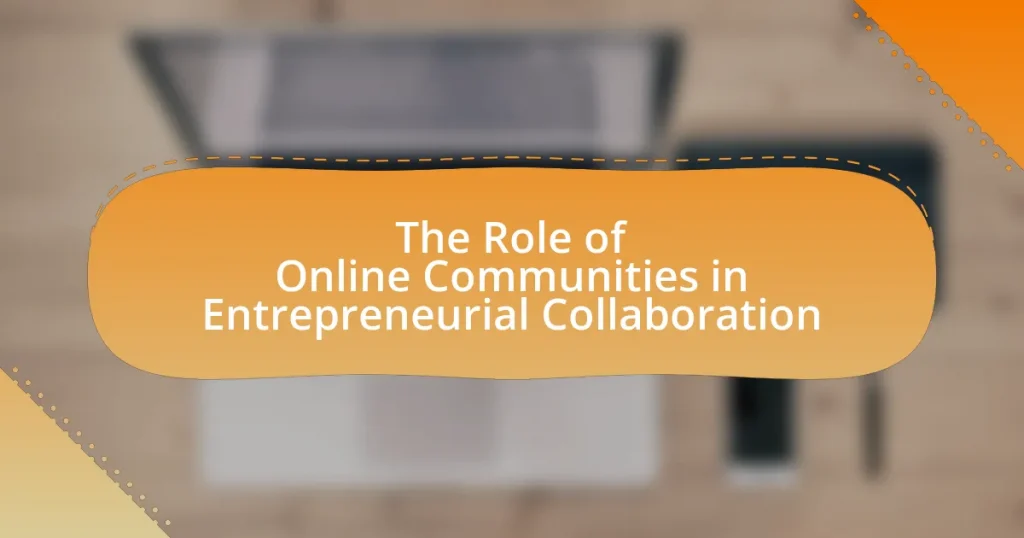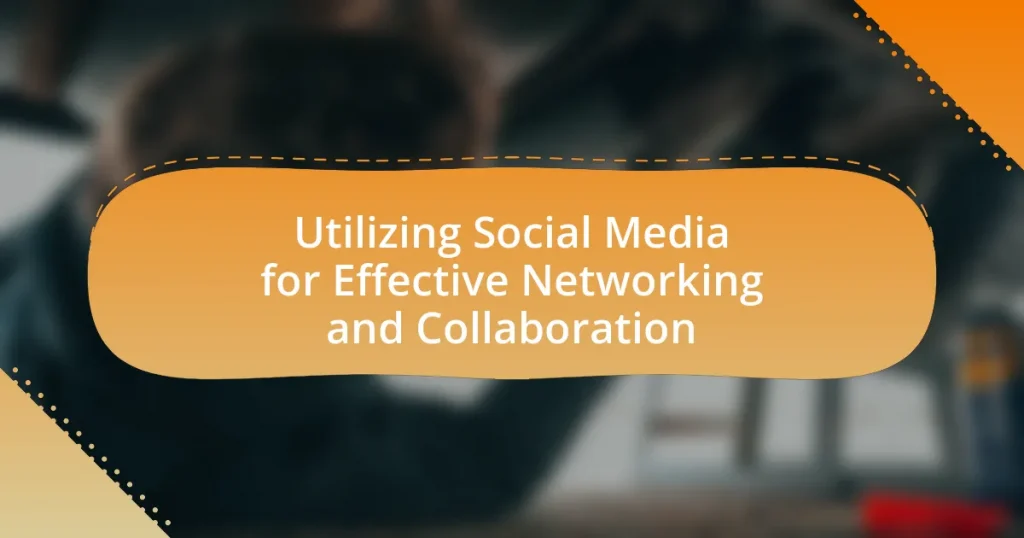Emotional intelligence is a critical component of entrepreneurial leadership, enabling leaders to manage their own emotions and understand the emotions of others. This article explores how emotional intelligence enhances leadership effectiveness, decision-making, team dynamics, and conflict resolution. Key components include self-awareness, self-regulation, motivation, empathy, and social skills, all of which contribute to improved communication and collaboration within teams. The article also addresses the challenges entrepreneurs face, the development of emotional intelligence, and its impact on employee satisfaction, retention, and innovation, underscoring its significance in achieving sustainable business growth.
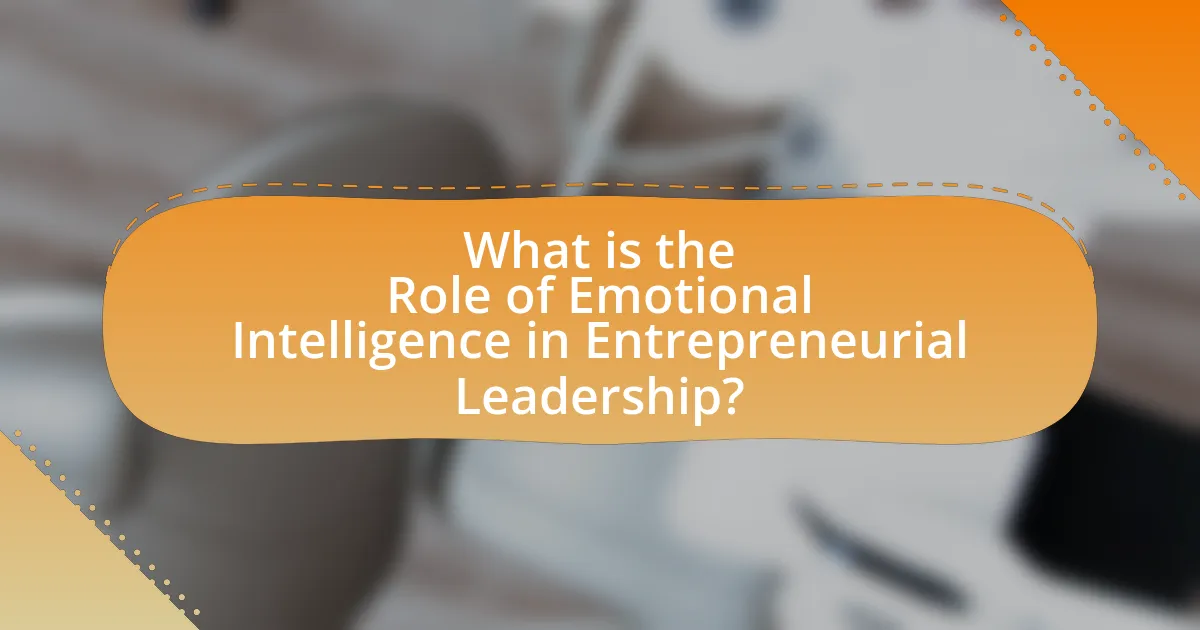
What is the Role of Emotional Intelligence in Entrepreneurial Leadership?
Emotional intelligence plays a crucial role in entrepreneurial leadership by enabling leaders to understand and manage their own emotions while effectively navigating the emotions of others. This skill set enhances decision-making, fosters strong team dynamics, and improves conflict resolution. Research indicates that leaders with high emotional intelligence are more adept at inspiring and motivating their teams, which can lead to increased productivity and innovation. For instance, a study published in the Journal of Business and Psychology found that emotional intelligence significantly correlates with leadership effectiveness, highlighting its importance in entrepreneurial contexts.
How does emotional intelligence influence leadership effectiveness?
Emotional intelligence significantly enhances leadership effectiveness by enabling leaders to understand and manage their own emotions while also empathizing with the emotions of others. This capability fosters better communication, conflict resolution, and team cohesion, which are critical for effective leadership. Research indicates that leaders with high emotional intelligence are more likely to create positive work environments, leading to increased employee satisfaction and productivity. For instance, a study published in the Journal of Organizational Behavior found that emotionally intelligent leaders positively impact team performance and employee engagement, demonstrating the direct correlation between emotional intelligence and effective leadership outcomes.
What are the key components of emotional intelligence in leadership?
The key components of emotional intelligence in leadership are self-awareness, self-regulation, motivation, empathy, and social skills. Self-awareness allows leaders to recognize their emotions and their impact on others, which is crucial for effective decision-making. Self-regulation enables leaders to manage their emotions and impulses, fostering a stable work environment. Motivation drives leaders to pursue goals with energy and persistence, inspiring their teams. Empathy helps leaders understand and respond to the emotions of others, enhancing team dynamics. Finally, social skills facilitate effective communication and relationship-building, essential for collaborative leadership. Research by Goleman (1995) highlights that leaders with high emotional intelligence are more successful in managing teams and achieving organizational goals.
How do these components impact decision-making in entrepreneurship?
Emotional intelligence components significantly impact decision-making in entrepreneurship by enhancing leaders’ ability to understand and manage their own emotions and those of others. High emotional intelligence allows entrepreneurs to navigate complex social interactions, fostering better communication and collaboration within teams. For instance, a study published in the Journal of Business Venturing found that entrepreneurs with strong emotional intelligence are more adept at recognizing emotional cues, which leads to improved negotiation outcomes and conflict resolution. This ability to empathize and connect with stakeholders ultimately influences strategic decisions, driving business success.
Why is emotional intelligence crucial for entrepreneurs?
Emotional intelligence is crucial for entrepreneurs because it enhances their ability to understand and manage their own emotions and those of others, leading to better decision-making and relationship-building. Entrepreneurs with high emotional intelligence can navigate the complexities of interpersonal dynamics, which is essential for effective leadership and team collaboration. Research indicates that emotionally intelligent leaders are more successful in fostering a positive work environment, which can increase employee satisfaction and retention. For instance, a study published in the Journal of Business and Psychology found that emotional intelligence significantly correlates with leadership effectiveness, highlighting its importance in entrepreneurial success.
What challenges do entrepreneurs face that emotional intelligence can address?
Entrepreneurs face challenges such as stress management, team dynamics, and decision-making, which emotional intelligence can effectively address. Emotional intelligence enables entrepreneurs to recognize and manage their own emotions, leading to better stress regulation and resilience in high-pressure situations. Additionally, it fosters improved communication and empathy, enhancing team collaboration and conflict resolution. Research indicates that leaders with high emotional intelligence are more successful in motivating their teams and navigating interpersonal relationships, which is crucial for entrepreneurial success. For instance, a study published in the Journal of Business and Psychology found that emotional intelligence positively correlates with leadership effectiveness and team performance, underscoring its importance in overcoming entrepreneurial challenges.
How does emotional intelligence contribute to team dynamics and collaboration?
Emotional intelligence significantly enhances team dynamics and collaboration by fostering better communication, empathy, and conflict resolution among team members. Teams with high emotional intelligence demonstrate improved interpersonal relationships, as members are more attuned to each other’s emotions and needs, leading to a supportive environment. Research indicates that teams with high emotional intelligence experience a 20% increase in performance and productivity, as they can navigate challenges more effectively and maintain positive interactions. This ability to understand and manage emotions not only strengthens collaboration but also promotes a culture of trust and respect, essential for successful teamwork.
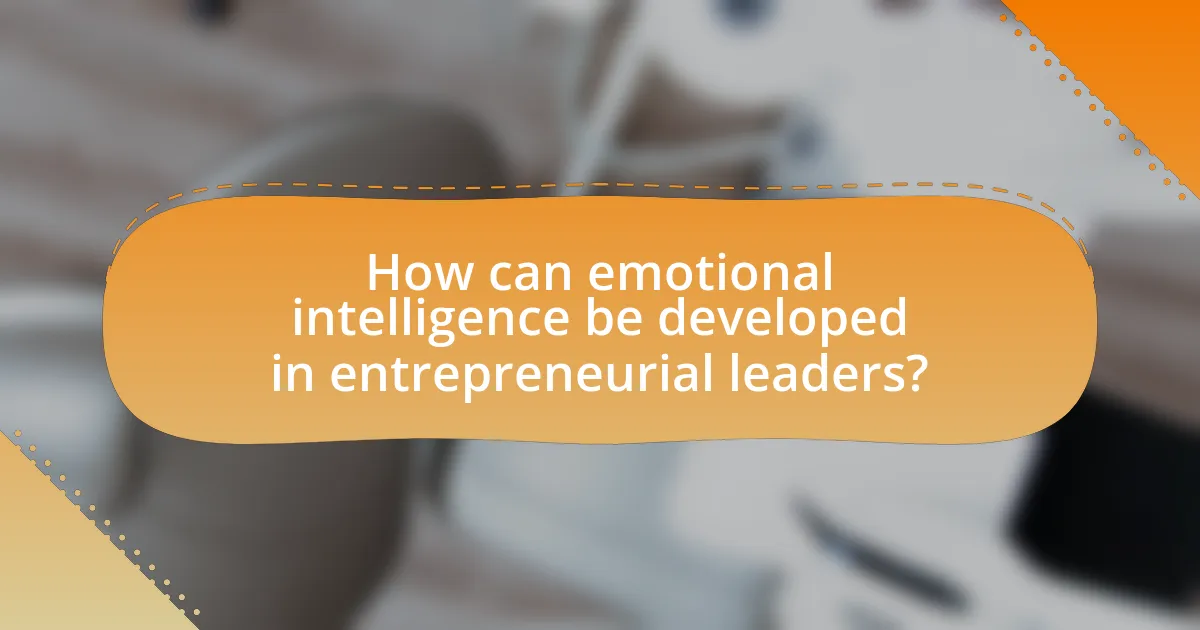
How can emotional intelligence be developed in entrepreneurial leaders?
Emotional intelligence can be developed in entrepreneurial leaders through targeted training, self-reflection, and feedback mechanisms. Training programs focused on emotional intelligence skills, such as empathy, self-regulation, and social skills, have been shown to enhance leaders’ ability to manage their emotions and understand others’ feelings. For instance, a study published in the Journal of Business and Psychology found that emotional intelligence training significantly improved participants’ leadership effectiveness and interpersonal relationships. Additionally, engaging in self-reflection practices, such as journaling or mindfulness, allows leaders to better understand their emotional responses and triggers. Regular feedback from peers and mentors can also provide insights into emotional behaviors, facilitating growth in emotional intelligence.
What strategies can entrepreneurs use to enhance their emotional intelligence?
Entrepreneurs can enhance their emotional intelligence by practicing self-awareness, developing empathy, and engaging in active listening. Self-awareness involves recognizing one’s emotions and their impact on decision-making, which can be improved through reflective practices such as journaling or mindfulness meditation. Developing empathy allows entrepreneurs to understand and relate to the emotions of others, fostering better team dynamics and customer relationships; this can be cultivated by seeking diverse perspectives and engaging in conversations that challenge one’s viewpoints. Active listening, which requires fully concentrating on the speaker and responding thoughtfully, can be enhanced through training and deliberate practice, leading to improved communication and conflict resolution skills. These strategies are supported by research indicating that high emotional intelligence correlates with effective leadership and better business outcomes.
How can self-awareness be cultivated among leaders?
Self-awareness among leaders can be cultivated through regular self-reflection, feedback mechanisms, and mindfulness practices. Leaders who engage in self-reflection, such as journaling or meditation, can better understand their thoughts, emotions, and behaviors, leading to improved self-awareness. Additionally, seeking feedback from peers and subordinates allows leaders to gain insights into how their actions affect others, fostering a more accurate self-perception. Research indicates that mindfulness practices enhance emotional regulation and self-awareness, as demonstrated in studies published in the Journal of Occupational Health Psychology, which found that mindfulness training significantly improved self-awareness and emotional intelligence among participants.
What role does feedback play in developing emotional intelligence?
Feedback is crucial in developing emotional intelligence as it provides individuals with insights into their emotional responses and behaviors. This process allows individuals to recognize their strengths and weaknesses in emotional regulation and interpersonal interactions. Research indicates that receiving constructive feedback enhances self-awareness, a key component of emotional intelligence, by helping individuals understand how their actions affect others. For instance, a study published in the Journal of Applied Psychology found that feedback significantly improves emotional awareness and empathy, which are essential for effective leadership. Thus, feedback serves as a vital tool for fostering emotional intelligence, enabling individuals to adapt their behaviors and improve their leadership capabilities.
What are the common misconceptions about emotional intelligence in leadership?
Common misconceptions about emotional intelligence in leadership include the belief that it is solely about being nice or empathetic, that it cannot be developed, and that it is less important than technical skills. Emotional intelligence encompasses a range of skills, including self-awareness, self-regulation, social skills, empathy, and motivation, which are critical for effective leadership. Research by Goleman (1995) indicates that emotional intelligence can be cultivated through training and practice, countering the notion that it is an innate trait. Furthermore, studies show that leaders with high emotional intelligence often outperform their peers in terms of team performance and employee satisfaction, highlighting its significance alongside technical competencies.
How do these misconceptions affect entrepreneurial practices?
Misconceptions about emotional intelligence significantly hinder entrepreneurial practices by leading to poor decision-making and ineffective leadership. Entrepreneurs who underestimate the importance of emotional intelligence may struggle to build strong relationships with their teams, resulting in low morale and high turnover rates. Research indicates that companies with emotionally intelligent leaders experience 20% higher employee satisfaction, which directly correlates with increased productivity and profitability. Furthermore, misconceptions can cause entrepreneurs to overlook the value of empathy and communication, essential components for understanding customer needs and fostering innovation. This lack of awareness can ultimately limit a business’s growth potential and competitive edge in the market.
What evidence supports the importance of emotional intelligence in leadership?
Emotional intelligence is crucial in leadership as it enhances decision-making, team dynamics, and overall organizational performance. Research by Goleman (1998) indicates that leaders with high emotional intelligence can better manage stress, communicate effectively, and foster a positive work environment, leading to increased employee satisfaction and retention. Additionally, a study published in the Journal of Organizational Behavior found that emotional intelligence significantly correlates with leadership effectiveness, demonstrating that leaders who understand and manage their emotions, as well as those of their team members, achieve better results. This evidence underscores the vital role emotional intelligence plays in successful leadership.
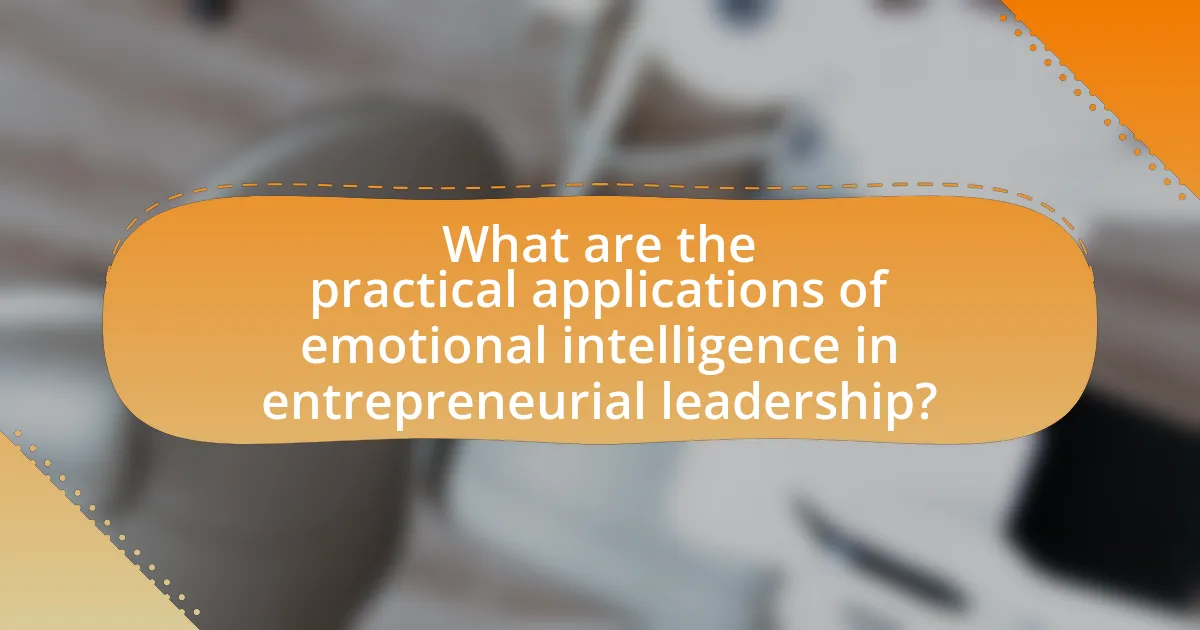
What are the practical applications of emotional intelligence in entrepreneurial leadership?
Emotional intelligence in entrepreneurial leadership enhances decision-making, team dynamics, and conflict resolution. Leaders with high emotional intelligence can recognize and manage their own emotions and those of others, leading to improved communication and collaboration within teams. For instance, a study published in the Journal of Business and Psychology found that emotionally intelligent leaders foster a positive work environment, which increases employee engagement and productivity. Additionally, these leaders are better equipped to navigate challenges and adapt to change, as they can empathize with their team members and respond effectively to their needs. This ability to connect on an emotional level ultimately drives innovation and business success.
How can emotional intelligence improve conflict resolution in teams?
Emotional intelligence enhances conflict resolution in teams by enabling individuals to recognize and manage their own emotions and those of others. This awareness fosters better communication, allowing team members to express their concerns and feelings constructively. Research indicates that teams with high emotional intelligence experience 20% less conflict and improved collaboration, as members are more adept at empathizing with differing perspectives and finding common ground. By facilitating open dialogue and reducing misunderstandings, emotional intelligence directly contributes to more effective and harmonious conflict resolution within teams.
What techniques can leaders use to manage conflicts effectively?
Leaders can manage conflicts effectively by employing techniques such as active listening, mediation, and fostering open communication. Active listening allows leaders to fully understand differing perspectives, which can de-escalate tensions and promote empathy among team members. Mediation involves facilitating discussions between conflicting parties to help them reach a mutually agreeable solution, thereby reinforcing collaboration. Fostering open communication creates an environment where team members feel safe to express their concerns and ideas, reducing misunderstandings and preventing conflicts from arising. Research indicates that leaders who utilize these techniques can significantly improve team dynamics and overall productivity, as evidenced by a study published in the Journal of Business and Psychology, which found that effective conflict management correlates with higher employee satisfaction and performance.
How does emotional intelligence influence negotiation outcomes?
Emotional intelligence significantly influences negotiation outcomes by enhancing communication, fostering trust, and improving conflict resolution. Individuals with high emotional intelligence can recognize and manage their own emotions while also empathizing with others, which leads to more effective interactions during negotiations. Research indicates that negotiators with strong emotional intelligence are better at reading non-verbal cues and adapting their strategies accordingly, resulting in more favorable agreements. For instance, a study published in the “Journal of Organizational Behavior” by Wong and Law (2002) found that emotional intelligence positively correlates with negotiation effectiveness, demonstrating that emotionally intelligent negotiators achieve better results by creating collaborative environments and addressing the emotional needs of all parties involved.
What best practices can entrepreneurs adopt to leverage emotional intelligence?
Entrepreneurs can leverage emotional intelligence by practicing self-awareness, empathy, and effective communication. Self-awareness allows entrepreneurs to recognize their emotions and understand how these feelings affect their decision-making and interactions. Empathy enables them to connect with their team and customers, fostering a supportive environment that enhances collaboration and loyalty. Effective communication ensures that they convey their ideas clearly and listen actively, which builds trust and strengthens relationships. Research by Goleman (1995) highlights that leaders with high emotional intelligence can improve team performance and employee satisfaction, demonstrating the tangible benefits of these practices in a business context.
How can leaders create an emotionally intelligent organizational culture?
Leaders can create an emotionally intelligent organizational culture by prioritizing empathy, open communication, and emotional awareness within their teams. By modeling empathetic behavior, leaders encourage employees to express their feelings and perspectives, fostering a supportive environment. Research indicates that organizations with high emotional intelligence report 20% higher employee satisfaction and 30% higher productivity, demonstrating the tangible benefits of such a culture. Additionally, implementing training programs focused on emotional intelligence skills can enhance interpersonal relationships and conflict resolution, further solidifying an emotionally intelligent workplace.
What role does emotional intelligence play in employee retention and satisfaction?
Emotional intelligence significantly enhances employee retention and satisfaction by fostering a supportive work environment and improving interpersonal relationships. Employees with high emotional intelligence can better understand and manage their own emotions, as well as empathize with colleagues, leading to effective communication and conflict resolution. Research indicates that organizations with emotionally intelligent leaders experience lower turnover rates; for instance, a study published in the Journal of Organizational Behavior found that emotional intelligence in leadership correlates with increased employee engagement and job satisfaction. This connection underscores the importance of emotional intelligence in creating a positive workplace culture, ultimately contributing to higher retention rates and overall employee satisfaction.
What are the long-term benefits of emotional intelligence for entrepreneurial leaders?
Emotional intelligence provides long-term benefits for entrepreneurial leaders by enhancing their ability to manage relationships, make informed decisions, and foster a positive organizational culture. Leaders with high emotional intelligence can effectively navigate social complexities, leading to improved team collaboration and employee satisfaction. Research indicates that companies led by emotionally intelligent leaders experience higher employee retention rates, with a study from the Harvard Business Review showing that emotionally intelligent leaders can increase team performance by up to 30%. Additionally, these leaders are better equipped to handle stress and adapt to change, which is crucial in the dynamic landscape of entrepreneurship. This adaptability contributes to sustained business growth and innovation over time.
How does emotional intelligence contribute to sustainable business growth?
Emotional intelligence contributes to sustainable business growth by enhancing leadership effectiveness, employee engagement, and customer relationships. Leaders with high emotional intelligence can better understand and manage their own emotions and those of their team, fostering a positive work environment that encourages collaboration and innovation. Research indicates that organizations with emotionally intelligent leaders experience higher employee satisfaction and retention rates, which are crucial for long-term success. For instance, a study published in the Journal of Organizational Behavior found that emotional intelligence is positively correlated with job performance and organizational commitment, leading to improved productivity and reduced turnover. This creates a stable workforce that drives sustainable growth. Additionally, emotionally intelligent leaders are adept at building strong relationships with customers, resulting in increased loyalty and repeat business, further contributing to the sustainability of the organization.
What impact does emotional intelligence have on innovation and creativity?
Emotional intelligence significantly enhances innovation and creativity by fostering an environment conducive to collaboration and open communication. Individuals with high emotional intelligence can better understand and manage their own emotions, as well as empathize with others, which leads to improved teamwork and idea sharing. Research indicates that teams with emotionally intelligent members are more likely to engage in creative problem-solving and generate innovative solutions, as they can navigate interpersonal dynamics effectively. For instance, a study published in the Journal of Business Research found that emotional intelligence positively correlates with creative performance in teams, highlighting its critical role in driving innovation within organizations.
What practical tips can entrepreneurs implement to enhance their emotional intelligence?
Entrepreneurs can enhance their emotional intelligence by practicing self-awareness, active listening, and empathy. Self-awareness involves regularly reflecting on one’s emotions and reactions, which can be achieved through journaling or mindfulness exercises. Active listening requires entrepreneurs to fully engage with others during conversations, ensuring they understand different perspectives and feelings. Empathy can be developed by putting oneself in others’ shoes, which helps in building stronger relationships and improving team dynamics. Research indicates that leaders with high emotional intelligence can improve team performance and employee satisfaction, as evidenced by a study published in the Journal of Organizational Behavior, which found a positive correlation between emotional intelligence and leadership effectiveness.
